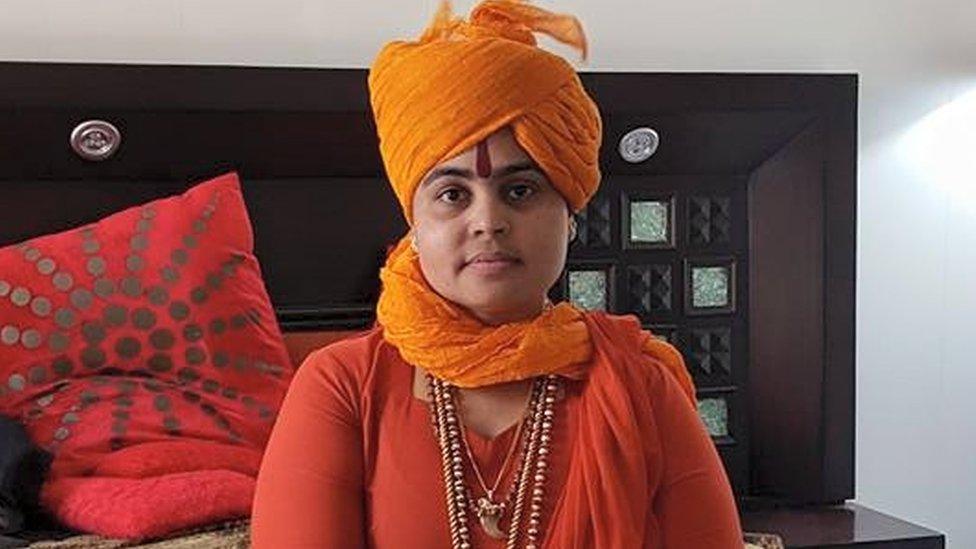Ram Rahim: Anger over parole for Indian guru jailed for rape
- Published
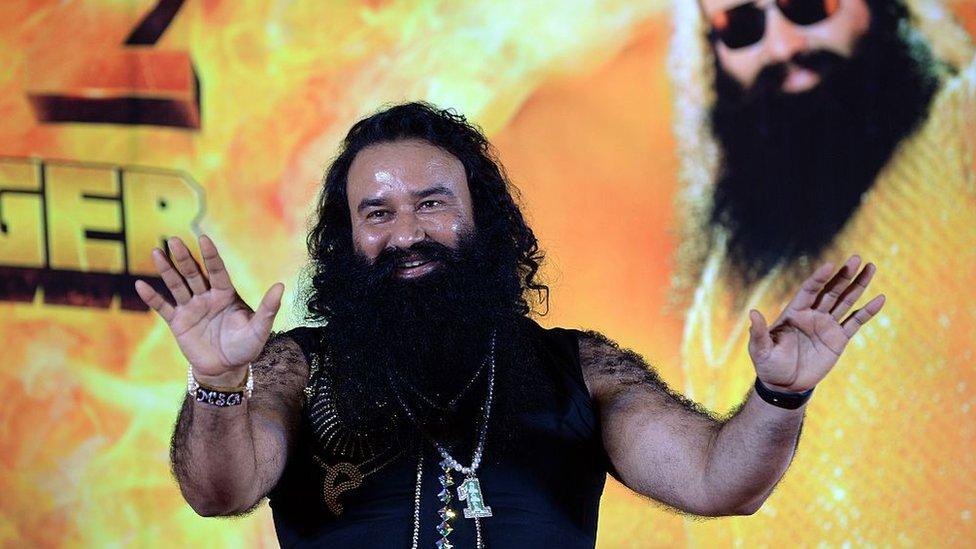
Gurmeet Ram Rahim Singh was one of India's most influential religious leaders until his conviction
Last week, a video of a controversial religious guru, who is serving long jail sentences for rape and murder, went viral in India.
It showed Gurmeet Ram Rahim Singh, leader of the Dera Sacha Sauda sect, out of prison on parole and cutting a cake with Honeypreet Insan, a young woman he calls his adopted daughter. The celebration was to mark her Instagram account reaching a million followers.
A few days earlier, another video had gone viral that showed the guru cutting another, much larger cake with a sword.
The videos made headlines in India, with critics asking why the authorities are allowing Singh "frequent parole".
Singh has been held at Sunaria jail in the northern state of Haryana since August 2017 when he was convicted of raping two female followers and sent to prison for 20 years. In 2019, he was sentenced to life for the murder of a journalist and in 2021, he received another life sentence for the 2002 murder of one of his employees.
But despite being convicted of such serious crimes, Singh has been out of prison for a total of 131 days in the past 13 months - he was granted a 21-day furlough in February 2022; parole in June for 30 days and again in October for 40 days. And on 21 January, he was let out for another 40 days.
An official from Singh's Dera Sacha Sauda told the BBC that "parole is a right of all prisoners, it's a human right".
"He's spending his time in spiritual discourse, he's working hard to address problems of people, working on the de-addiction programme," the official said, claiming that every day 100,000 people were quitting drugs because of him.
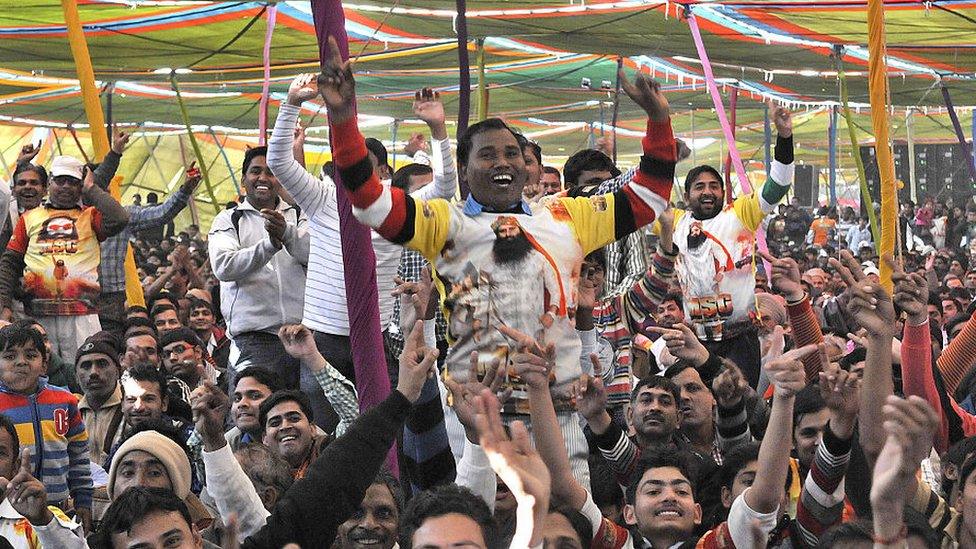
Singh has millions of followers
But Singh's release has been greeted with dismay on social media, with many wondering how a man found guilty of crimes such as rape and murder could be allowed out of prison.
Sikhism's highest religious organisation, the Shiromani Gurdwara Parbandhak Committee (SGPC), has filed a petition in court challenging his parole, saying "it sends a wrong message to society".
SGPC General Secretary Gurcharan Singh Grewal told the BBC that Singh was "a disgrace" and his presence outside jail was "bad for society".
Until his conviction in 2017, Singh was one of India's most influential religious leaders. With tens of millions of followers, his sprawling headquarters in the town of Sirsa in Haryana, where he was based, was visited by hundreds of thousands of devotees every year.
Known as the "guru of bling" because of his love for outlandish outfits and jewellery, Singh was also called "rockstar baba" - he acted in films he made, performed rock concerts and rubbed shoulders with the high and mighty in India.
For years, he was courted by India's main political parties, the Congress and the governing Bharatiya Janata Party (BJP), for his ability to influence election outcomes by asking his followers to vote for one party or the other.
In recent years, he's thrown his lot behind the BJP. In the run-up to the 2014 Haryana state assembly elections, he urged his followers to vote for the party, which went on to win the vote.
Before his fall from grace, he was photographed with Haryana Chief Minister Manohar Lal Khattar on a number of occasions.
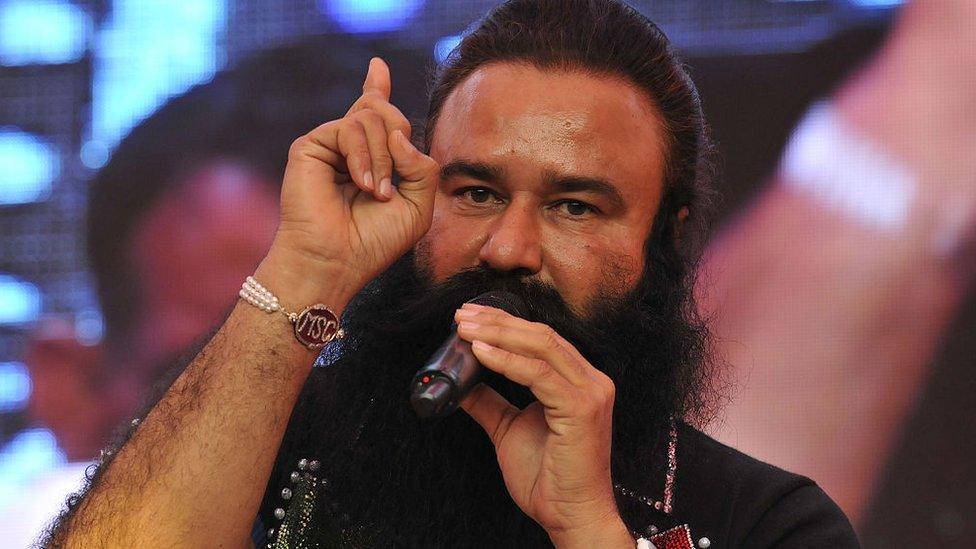
Singh has acted in films and performed rock concerts
Even after his convictions and the long jail sentences he received, it appears that Singh's influence hasn't waned.
Reports say that from his ashram in Barnawa, in Uttar Pradesh state's Baghpat district, where he's staying during parole, he's been holding virtual meetings with tens of thousands of followers.
After several BJP politicians were seen in attendance, opposition parties began accusing the party of having a hand in the parole he had been given.
The party's chief spokesman in Haryana, Sanjay Sharma, denied that the BJP or its government had any role in granting Singh parole.
"The individuals who visit him or attend his discourses do it because they have faith in him. We don't have a soft corner for him, we let the law take its own course," Mr Sharma told the BBC.
Besides, he said that "it's the jail authorities or the district administration that approve parole" and that "it's all being done within the ambit of the law".
Divisional Commissioner Sanjeev Verma, head of administration for Rohtak district where the jail housing Singh is located, refused to answer the BBC's questions on his parole, saying the matter was in court and hence sub judice.
The director general of prisons Mohammad Akil also refused to speak but added that two similar earlier petitions against Singh's parole had been thrown out by the courts.
Supreme Court lawyer Akshat Bajpai says it is very difficult to get parole and adds that it's hard to understand how Singh manages it repeatedly.
Parole and furlough are "extraordinary measures meant to cater to specific needs of prisoners, such as a death in the family or marriage of children or siblings, but they are not meant to subvert judicial orders".
"Singh's not an under-trial, he's a convicted prisoner who's been found guilty by court of such heinous crimes as rape and murder. But every three-four months he is out.
"And the brazenness with which he conducts himself is shocking. He's seen cutting a cake with a sword which is an offence under the Arms Act, he's composing and releasing music videos, he's making a mockery of the criminal justice system," he adds.

Read more India stories from the BBC:

- Published14 August 2015
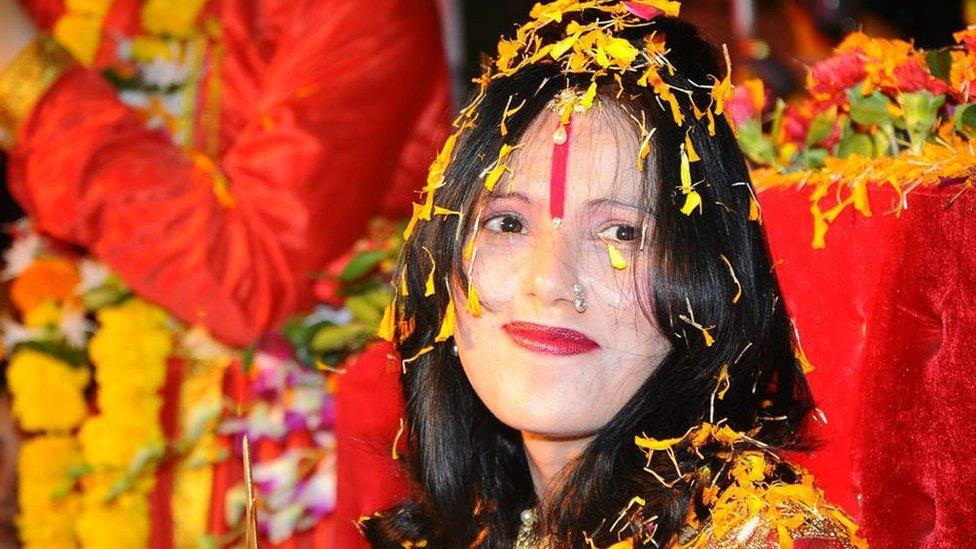
- Published18 November 2016
